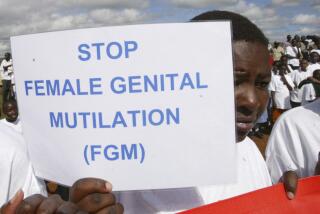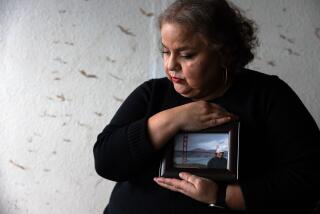Togo Woman, Granted U.S. Asylum, to Seek Citizenship
- Share via
WASHINGTON — A young West African woman who has won political asylum because of the threat of genital mutilation in her homeland plans to apply for U.S. citizenship and begin training as a nurse, her attorneys said Friday.
Law professors from American University who handled the case of Fauziya Kasinga without fee hailed Thursday’s ruling by the nation’s highest immigration tribunal as establishing, for the first time, that forced mutilation may constitute legal grounds for fleeing persecution.
But, they said, the 11-1 decision by the Board of Immigration Appeals is not likely to “open the floodgates” to millions of other female asylum-seekers. Most women who face the ancient ritual do not have the sophistication or the resources to flee to the United States, according to the lawyers.
“Quite frankly, most women facing forced mutilation do not have control over their lives,” attorney Karen Musalo said. “The ruling establishes that this crude practice is persecution within the meaning of the asylum law. But under the ruling, any other applicants seeking asylum will have to come forward and meet the burden of proof on a case-by-case basis.”
The nation’s 179 immigration judges who hear asylum cases have been divided on whether fleeing mutilation constitutes fleeing persecution. The new ruling clarifies the issue and thus serves as a precedent, Musalo said.
Richard Boswell, another professor who helped represent Kasinga, said that the board’s decision “constitutes a long-awaited righting of the injustice she suffered by the Immigration and Naturalization Service.”
The 19-year-old woman fled her native Togo two years ago to escape the practice and was imprisoned for 16 months in a series of four detention centers after a lower-level immigration judge rejected her claim on grounds that she was not believable. But the American University law professors took up her case and convinced the appeals board.
Lawyers for the INS also said that they were pleased by the ruling, even though they had argued to the board last month that Kasinga’s case should be remanded to the lower court judge for more fact-finding.
“The INS is pleased that the board recognized that female genital mutilation can be the basis for asylum,” INS general counsel David Martin said.
He called forced mutilation “a deeply objectionable cultural practice increasingly subject to condemnation on an international plane,” adding that “we are pleased there now is precedent to govern these new and difficult claims.”
Musalo said that the young woman will continue to live with a family in the Washington area. Within one year she can apply for permanent residence in the United States, and after that she will apply for citizenship, the lawyer said.
More to Read
Sign up for Essential California
The most important California stories and recommendations in your inbox every morning.
You may occasionally receive promotional content from the Los Angeles Times.













